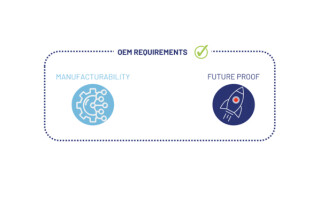More content, guided by database
January 01, 2010
A flexible hybrid database at work in the reference design of an electronic programming guide provides a cost-effective way to find and retrieve conte...
Or consider a DBMS that provides both navigational and SQL APIs. While not ideal for real-time EPG processing, SQL can be fast and useful to generate ad hoc database queries and reports. And some SQL interfaces also map to the ODBC standard for interoperability, permitting data sharing between the EPG and a range of external systems.
In-memory and/or hybrid data storage
In-Memory Database Systems (IMDSs) store data in main memory, eliminating the I/O, caching, and data transfers that burden traditional DBMS performance. This makes IMDSs faster, and the streamlined design reduces CPU demands, both of which are big pluses for set-top boxes. For many EPGs, lack of persistent storage is a non-issue; if memory content is lost, the guide is easily downloaded from the cable head end or satellite transponder.
A few DBMSs such as McObject’s eXtremeDB Fusion offer a hybrid approach permitting both in-memory and persistent (disk and flash memory-based) storage, including, if desired, both types of storage in the same database instance. By enabling both kinds of storage, eXtremeDB Fusion (shown in Figure 1) spares developers the expense, learning curve, and support costs of incorporating multiple embedded database products across a product line. DIRECTV, for example, integrates eXtremeDB Fusion in both its disk-based and diskless set-top boxes, enabling it to deploy a unified software platform across these devices.
Portability and reduced risk
A final DBMS attribute that benefits programming guides is portability. With embedded software’s lifespan often exceeding that of hardware, an EPG and its database component should be able to move seamlessly between operating environments. Available database source code is especially useful in accommodating new platforms.
Using a commercial off-the-shelf DBMS in MOD Systems’ reference design “removed risks and unknowns inherent in custom-written code, shortening development time and proving the cost-effectiveness of this COTS solution,” remarked Todd Duffin, the company’s technical program manager. The approach is also expected to provide consumers with faster access to programming information when they bring home movies and lower manufacturers’ costs in producing devices that will play the content. These advantages all bode well for the success of MOD Systems’ retail distribution system.
Ted Kenney, director of marketing for McObject (Issaquah, Washington), has a solid technical background with more than 12 years in the embedded systems, database, and enterprise software market segments. He has launched numerous products in the United States and international markets, and is a veteran of software, media, and restaurant industry start-ups. Ted holds a BA from Columbia University and an MBA from the University of California at Berkeley.
McObject
425-888-8505
www.mcobject.com






